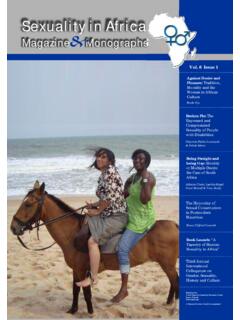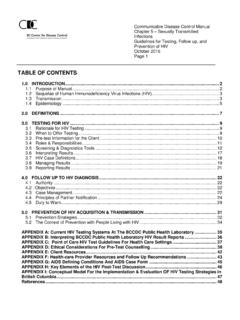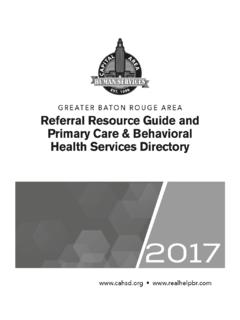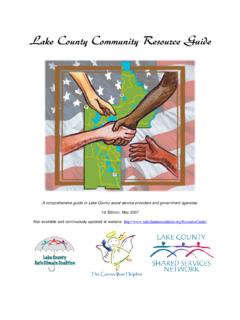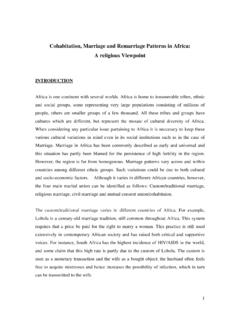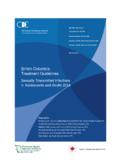Transcription of Sexuality Education in Nigeria: Evolution, Challenges and ...
1 AFRICA REGIONAL Sexuality . RESOURCE CENTRE. Understanding Human Sexuality Seminar Series 3. Sexuality Education in nigeria : evolution , Challenges and Prospects ADUNOLA ADEPOJU (PhD). Department of Arts and Social Sciences Faculty of Education University of Lagos nigeria Lagos, nigeria March 24, 2005. ARSRC 2005. 1. Introduction Ancient theories and ideologies about Sexuality , circled around the power of dreams, the individual as a sexual being, the power of self cultivation and processes of essentialism. Although the concept of Sexuality can be dated back to our ancestors, who laid much emphasis on the care of self and the act of procreation, emerging population and health concerns have led to the re-thinking and re-identification of the relationship between Sexuality and human activity and behaviour. Invariably, the concept of Sexuality has undergone many changes within the past forty years. The emergence of the sexual revolution has also impacted greatly on sexual orientations, patriarchy, sexual relations, family formations and reproduction.
2 In recent times, the youth who constitute ages 10-24 and per cent of the Nigerian population, are found to be highly vulnerable to antisocial behaviours such as violent crimes, unsafe sexual activities and drug abuse among others. The Nigerian Association for the Promotion of Adolescent Health and Development, (NAPAHD) has also alerted that, an hospital based research has shown that, 80 per cent of patients with abortion complications are adolescents. This assertion was based on the fact that, over 16 per cent of teenage females reported first sexual intercourse by age 15 while per cent of boys of age 15. have also had their first encounters. This adolescents' health dilemma has been attributed to their great lack of information and knowledge about the implications of their population behaviour on their sexual health and the general welfare of the nation. In this vain the introduction and institutionalisation of Sexuality Education became one of the immediate efforts made to address this problem to create awareness about these sexually based problems.
3 The rational was to acquaint the youth with factual and accurate sexual information about the dimensions of sexual knowledge that will enable them understand and clarify their personal values, improve their sexual knowledge and sexual decision making and promote their knowledge about how all these interact with socio-cultural and religious factors to affect personal well-being. This set of values Sexuality Education was set to promote perhaps form part of the motivation for its introduction into the Nigerian educational system. However, in view of the predicament suffered by similar intervention packages such as Population/Family-life Education it is relevant to examine the potentials for success and failure of this nascent subject. With this backdrop, this paper will examine the origin of the concept of Sexuality Education , how it evolved in nigeria and how well it is fairing in nigeria . In doing this, the paper will highlight on some conceptual perspectives of Sexuality Education , identify its definition, its content and structure.
4 The prospects and Challenges of Sexuality Education in nigeria today will also be identified by looking into the relationship between Sexuality and; society and culture, socio- economic status, ethics, communication, information, gender and the media. 2. Conclusions will be drawn and practical ways of moving Sexuality Education forward in nigeria will be suggested. Conceptual Perspective The following conceptual perspectives guide the discussions presented in this paper. Foucault (1986) asserts that, individualistic attitude is characterised by the absolute value attributed to individual's singularity and by the degree of independence conceded to him vis- -vis the group and institution he is answerable to; that is, the way a person behaves will depend largely on what he values, the amount of freedom he is allowed and what the society expects of him. The interrelationship of biological, psychological and socio-cultural dimensions determines the total personality of an individual.
5 Ikpe (2004) postulated that Sexuality defines the very essence of one's humanity including one's self image, being male or female, physical looks and reproductive capacity; that is Sexuality is a natural part of life. It is about the way we are made, how we feel about ourselves, what roles we play in the society and how we procreate . Culture as a way of life determines, to a large extent, human behaviour. It is patterned, learned, shared and adaptive and is transmittable from one generation to the other (Basso, 1997). Culture has a way of influencing every thing we do. It can be perpetuated and has the potential to overpower intervention programmes and educational innovations. Religious and spiritual beliefs influence feelings about morality, sexual behaviour, pre-marital sexual behaviour, adultery, divorce, contraception, abortion and masturbation (Greenberg et al 2000). Sexuality Education can be seen as yet another religion which is not necessarily different from what already obtains.
6 What is Sexuality Education ? Sexuality Education has been given various definitions by various schools of thought. AHI (2003) described Sexuality Education as a planned process of Education that fosters the acquisition of factual information, the formation of positive attitudes, beliefs and values as well as the development of skills to cope with the biological, psychological, socio-cultural and spiritual aspects of human Sexuality . That is, learning about the anatomy, physiology and bio-chemistry of the sexual response system which determines identity, orientations, thoughts and feelings as influenced by values beliefs, ethics and moral concerns. It is the interactive relationship of these dimensions that describes an individual's total Sexuality (SIECUS, 1995). Also, Sexuality Education teaches us that, religious principles, beliefs, rules and regulations and ethical considerations affect our everyday interactions just as our culture, role models in our families and our friends impact us as well.
7 Sexuality Education is simply the art of learning how to conform to a certain art of living by being able to reason, examine and monitor oneself in clearly defined terms. 3. Origin of Sexuality Education Sexuality Education came into being in different countries at various times. The sexual revolution of the 1800s contributed immensely to the debate of sexual pleasure as an ethical substance which continued to be governed by relations of force, struggle and establishment of dominion. During that period, women started agitating for more debates on issues concerning their Sexuality . They questioned and revolted against rules and regulations prohibiting the use of contraceptives and the spread of information about them. The first six to seven decades of that century, saw both males and females beginning to question the concept of virginity and male dominance. Bruess and Greenberg (1994) revealed that, between 35 and 45 per cent of females and 55-65 per cent of males engaged in sexual relationships before marriage at that time.
8 As far back as 1897 a female Swedish doctor, Karolina Widerstorm, saw the need to educate the young especially the girls about sexual hygiene as a way of informing and protecting them from sexually transmitted diseases such as gonorrhoea and syphilis which were found to be very common during that period. To her, the idea was that, if girls got to know in good time how pregnancy came about and how sexually transmitted diseases were spread, they would be better able to protect themselves. In this way girls were considered to be able to take responsibility for the sexual health for boys as well as for themselves (Lena, 2000). Given the controversial nature of Sexuality Education at that time, the high prevalence of sexually transmitted diseases was used as the basis of introducing Sexuality Education in the schools. Despite all the positive potentials of Sexuality Education , the major Challenges were what form Sexuality should take and at what level it should be introduced in the schools.
9 There was also the problem of methodology. Sexuality Education was seen as the gospel of the flesh that could lead to sexual espionage, egoism and revelry among the young. The young recipients of Sexuality Education were therefore referred to as victims . Notwithstanding, serious advocates of Sexuality Education insisted on driving home the potentials of Sexuality Education such as building new standards and removing deceptions between people and by the dawn of the 1900s, several events had occurred which changed the way people perceived Sexuality hence Sexuality Education was introduced in Swedish schools. Talking to the young about sexual life became less controversial among the Swedish. As women became empowered with Education , their number in the workforce increased and this made them assume a visibly significant part of the society. They appeared more aggressive in their demands for equality in all spheres of human endeavour. Overall, they became more active partners in sexual activity.
10 These new women, according to Murstein (1974), wanted freedom similar to that of the men. The rise in the status of women in America during that period also enhanced discussions on Sexuality issues. There was a significant effect on the receptivity to the subject of Sexuality by the people. 4. In nigeria as well, traditional forms of Sexuality Education existed in kinship systems and coming-of-age ceremonies where the youth were tutored about manhood and womanhood. Its essence was purely biological and culture specific. There were various methods of contraceptives which included virginity, herbs, breastfeeding, the ring, and abstinence; most of which were strictly meant for the married and kept as a secret. Issues on sexually transmitted diseases were also of great concern but were barely discussed while the contraction of them was a big shame and stigma. The socialization process of the child remained strictly the only way of acquainting the child with issues like family relationships and public manners with very little room for self-expression.



